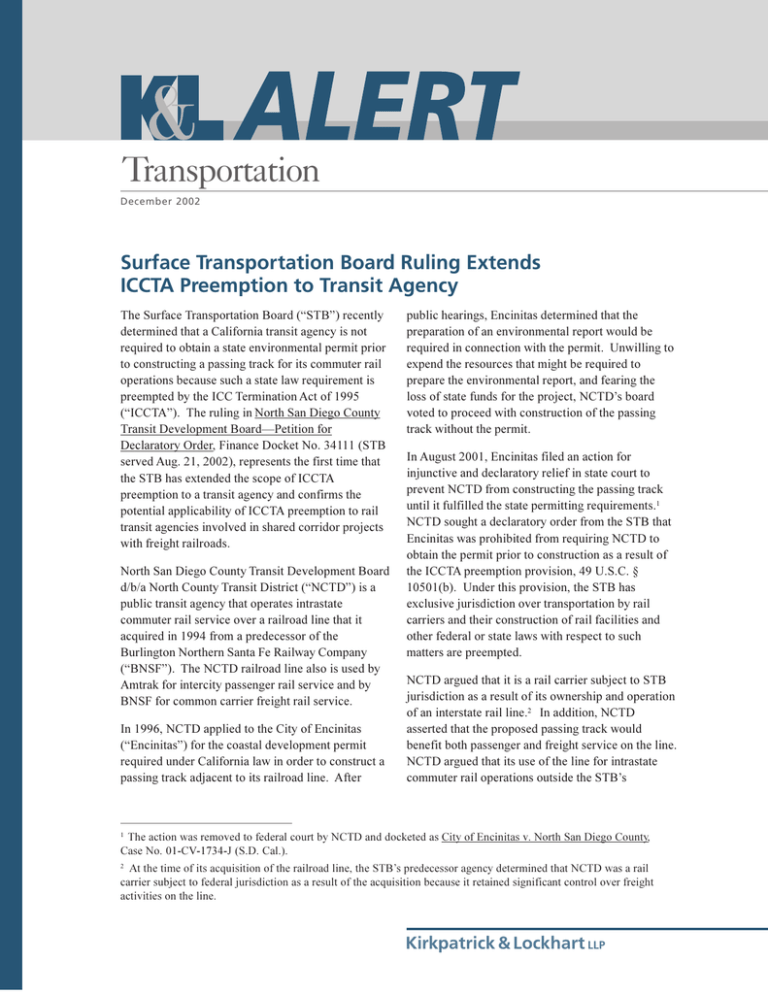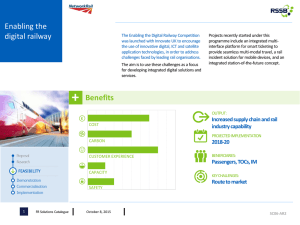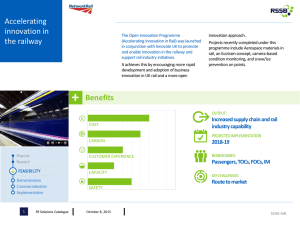
Transportation
December 2002
Surface Transportation Board Ruling Extends
ICCTA Preemption to Transit Agency
The Surface Transportation Board (STB) recently
determined that a California transit agency is not
required to obtain a state environmental permit prior
to constructing a passing track for its commuter rail
operations because such a state law requirement is
preempted by the ICC Termination Act of 1995
(ICCTA). The ruling in North San Diego County
Transit Development BoardPetition for
Declaratory Order, Finance Docket No. 34111 (STB
served Aug. 21, 2002), represents the first time that
the STB has extended the scope of ICCTA
preemption to a transit agency and confirms the
potential applicability of ICCTA preemption to rail
transit agencies involved in shared corridor projects
with freight railroads.
North San Diego County Transit Development Board
d/b/a North County Transit District (NCTD) is a
public transit agency that operates intrastate
commuter rail service over a railroad line that it
acquired in 1994 from a predecessor of the
Burlington Northern Santa Fe Railway Company
(BNSF). The NCTD railroad line also is used by
Amtrak for intercity passenger rail service and by
BNSF for common carrier freight rail service.
In 1996, NCTD applied to the City of Encinitas
(Encinitas) for the coastal development permit
required under California law in order to construct a
passing track adjacent to its railroad line. After
public hearings, Encinitas determined that the
preparation of an environmental report would be
required in connection with the permit. Unwilling to
expend the resources that might be required to
prepare the environmental report, and fearing the
loss of state funds for the project, NCTDs board
voted to proceed with construction of the passing
track without the permit.
In August 2001, Encinitas filed an action for
injunctive and declaratory relief in state court to
prevent NCTD from constructing the passing track
until it fulfilled the state permitting requirements.1
NCTD sought a declaratory order from the STB that
Encinitas was prohibited from requiring NCTD to
obtain the permit prior to construction as a result of
the ICCTA preemption provision, 49 U.S.C. §
10501(b). Under this provision, the STB has
exclusive jurisdiction over transportation by rail
carriers and their construction of rail facilities and
other federal or state laws with respect to such
matters are preempted.
NCTD argued that it is a rail carrier subject to STB
jurisdiction as a result of its ownership and operation
of an interstate rail line.2 In addition, NCTD
asserted that the proposed passing track would
benefit both passenger and freight service on the line.
NCTD argued that its use of the line for intrastate
commuter rail operations outside the STBs
The action was removed to federal court by NCTD and docketed as City of Encinitas v. North San Diego County,
Case No. 01-CV-1734-J (S.D. Cal.).
1
2
At the time of its acquisition of the railroad line, the STBs predecessor agency determined that NCTD was a rail
carrier subject to federal jurisdiction as a result of the acquisition because it retained significant control over freight
activities on the line.
Kirkpatrick & Lockhart LLP
jurisdiction does not divest the STB of exclusive and
plenary jurisdiction over the freight rail services
provided on the line by BNSF and construction of
facilities that might benefit such services. Encinitas
and the California Coastal Commission (collectively,
Respondents) objected to NCTDs petition,
contending that the passing track would solely
benefit intrastate commuter rail operations outside
the STBs jurisdiction. The Respondents also argued
that the enforcement of applicable environmental
permitting requirements was a legitimate exercise of
their police powers under the Constitution and
therefore not preempted by ICCTA.
The parties made similar arguments in the parallel
federal court proceeding. The federal court ruled on
January 14, 2002 that the permit requirement was
preempted by ICCTA. The court found Encinitas
attempt to impose environmental or permit
regulations on NCTD to be tantamount to economic
regulation of a rail carrier. The court held that
ICCTA preempts such economic regulation of rail
carriers by state and local governments and vests
jurisdiction over such matters exclusively with the
STB.
In its decision served August 21, 2002, the STB
agreed with the federal court and determined that
any requirement by the City under California state
law that NCTD obtain a permit or other prior
approval in order to build the passing track is
preempted by section 10501(b). The STB
confirmed that NCTD was a rail carrier subject to its
jurisdiction and found that NCTDs commuter rail
activities did not affect NCTDs rights and
obligations under ICCTA as the owner and operator
of an interstate rail line. In addition, the STB found
that because of the anticipated benefit to BNSFs
common carrier interstate rail freight operations
[from the construction of the passing track], there is
no doubt that we have jurisdiction and that this case
falls within section 10501(b). Relying on
considerable STB precedent involving freight rail
carriers, the STB found that state and local
permitting or similar pre-approval requirements are
preempted because they could prevent NCTD from
constructing a facility that would benefit both
passenger rail operations and freight rail operations
subject to exclusive STB jurisdiction.3
The STBs decision in North San Diego County
Transit Development BoardPetition for
Declaratory Order is significant in several respects.
First, it represents the first time that the STB has
extended the scope of ICCTA preemption to a transit
agency. Second, it confirms that transit agencies
involved in joint freight-passenger rail projects
subject to state law permitting or similar preapproval requirements should consider the potential
applicability of ICCTA preemption. Although based
on a specific set of facts, the STBs decision strongly
suggests that a non-carrier transit agency may be
entitled to benefit from ICCTA preemption in
situations where proposed improvements or other
activities might benefit interstate freight rail
operations.
EDWARD J. FISHMAN
FOR FURTHER INFORMATION, please consult one of the lawyers
listed below:
Boston
Harrisburg
Pittsburgh
Jeffrey S. King
Carleton O. Strouss
Theodore A. McConnell
Stephen M. Olson
San Francisco Robert J. Sherry
Washington Edward J. Fishman
Kevin M. Sheys
617.261.3179
717.231.4503
412.355.6566
412.355.6496
415.249.1032
202.778.9456
202.778.9290
jking@kl.com
cstrouss@kl.com
tmcconnell@kl.com
solson@kl.com
rsherry@kl.com
efishman@kl.com
ksheys@kl.com
In a decision served September 17, 2002, the STB
denied the Respondents petition to stay the effectiveness
of the STBs August 21 decision pending judicial review.
The Respondents have appealed the STBs August 21
decision to the D.C. Circuit and have appealed the federal
courts January 14 decision to the Ninth Circuit. These
appeals remain pending.
3
®
Kirkpatrick & Lockhart LLP
®
Challenge us.
www.kl.com
BOSTON
n
DALLAS
n
HARRISBURG
n
LOS ANGELES
n
MIAMI
n
NEWARK
n
NEW YORK
n
PITTSBURGH
n
SAN FRANCISCO
n
WASHINGTON
............................................................................................................................................................
This publication/newsletter is for informational purposes and does not contain or convey legal advice. The information herein
should not be used or relied upon in regard to any particular facts or circumstances without first consulting a lawyer.
© 2002 KIRKPATRICK & LOCKHART LLP.
ALL RIGHTS RESERVED.





